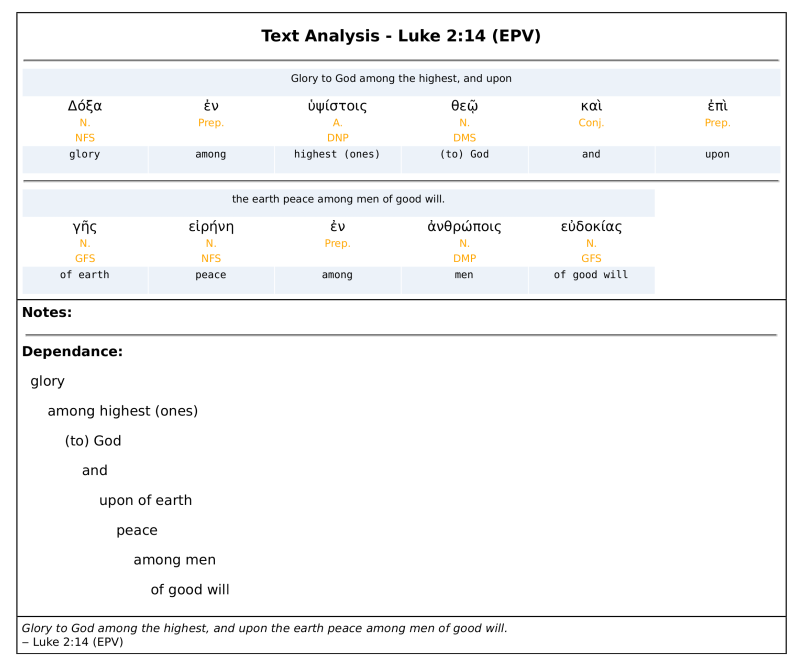The short answer is because they chose to. This "quip" answer reveals the challenge of answering most "why" questions, as "why" normally requires inference of motive, rather than actually interpreting anything directly from the text (unless the text gives insight into motive, in which case the "why" question would likely not even be a question, as it would already be answered in the text).
Nevertheless, some logical inference can be made to produce a longer, inferred, speculative answer.
Possible Grammatical Explanation
The Hebrew people often use verbless clauses in speech and writing, when the verb omitted is a state of being verb. This is so common that whole books have been written on the topic.
So the angels may be communicating as the Hebrew shepherds might expect via verbless statements, and the idea would then be that an implied being verb pairs with each nominative as the subject:
Glory [be] in [the] highest God
and upon [the] earth, peace [be],
in humanity, goodwill [be]
The clauses may be presently (to that time) factual statements: God has glory for what He is doing this night of Christ's birth, and God establishes/expresses His peace toward the earth and goodwill in humanity by this.
The clauses may be implied commands: The shepherds (and all people) ought to glorify God, be at peace, and have goodwill toward one another because of God's work this night.
The clauses may be prophetic statements: This child born tonight, when He takes final control of the earth, He will bring God glory, peace to all the earth, and a lasting goodwill among men.
All three ideas may be implied.
Possible Linguistic Explanation
Speech, words, are symbolic. The nominative case (as these statements all are centered on, with an associated prepositional phrase for each) is the most basic of that symbolism as it "names" objects and concepts, putting them out there for "consideration." Children generally learn to speak by first declaring nominative statements as they see (concrete) things: Mama! Bird! Puppy! Often pointing to it with great delight.
This does not go away when one grows up. As Daniel Wallace in Greek Grammar Beyond the Basics (Grand Rapids, MI: Zondervan, 1996)
The nominative is the case of specific designation. (p.37)
And as such, there are a variety of "grammatically independent uses of the nominative" (p.49) in Greek (or most langauges). One such use is that of "exclamation":
It is a primitive use of the language where emotion overrides syntax: The emotional topic is exclaimed without any verb stated.
An exclamation is indeed a "primitive use" in bringing words and emotion together to focus attention on the content of the exclamatory remark.
The keys to identifying a nominative of exclamation are: (1) the lack of a verb (though one may be implied), (2) the obvious emotion of the author, and (3) the necessity of an exclamation point in translation. (p.60)
Verbless? Check! Obvious emotion (here of the angels)? Check!?! (I see the sudden appearance and "praising" as contextually indicative of an emotive aspect.) Necessity of exclamation point? Debatable. Yes (NKJV, ESV, HCSB, NET, ISV, NRSV). No (KJV, ASV, NASB, NIV). I lean to the "yes."
So it may be the angels intended to convey an emotive contemplation of what it means that the Christ has been born.
Possible Cultural Explanation
Wallace also notes on pages 54-55 of Greek Grammar Beyond the Basics the use of the "nominative in proverbial expressions":
A substantive in the nominative is used in proverbial expressions that have no finite verb [emphasis his].... The reason for the unusual syntax is that the proverbial saying, even if fragmentary, has become a fixed part of the literary [we could add verbal as well] heritage. Since it is well known in that particularly pithy form, to round out the syntax would be to spoil the effect.
So this is another case of a verbless clause. I am not aware of (nor have I really looked for) any literary evidence to indicate for certain that any of these three phrases are distinctly proverbial; and whether they were proverbial in speech or not would be unknown without some literary record of that.
Certainly one can imagine the possibility that the three phrases may have been used proverbially. I can imagine Hebrew believers calling out "Glory [be] in [the] highest God" for any number of reasons of praise (but along the lines of Ps 57:5, 148:13), and offering prayers for God to bring peace on earth in the Messianic expectation of the "Prince of Peace" (Isa 9:6; see also Ps 37:11), and good things in humanity (similar to Ps 107:8, et al.).
Conclusion
There may be one or a combination of grammatical, linguistic, and cultural reasons why the angels chose to make the announcement this way. We cannot know for sure other than, if one believes God is in control of the announcement and of the inspired recording of it (as I do), that He wanted it done that way for His record of the events.
